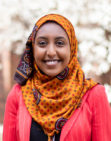“Believers Bail Out.” Believers Bail Out, 2020, believersbailout.org.
“CAIR At a Glance.” CAIR, Council on American-Islamic Relations, 2020, cair.com.
Crenshaw,Kimberlé Williams. “Demarginalizing the Intersection of Race and Sex: A Black Feminist Critique of Antidiscrimination Doctrine, Feminist Theory, and Antiracist Politics [1989].” Feminist Legal Theory, 2018, pp. 57–80.
Davis, Angela Y. Are Prisons Obsolete? Seven Stories Press, 2003.
Khabeer, Su’ad Abdul. Muslim Cool: Race, Religion, and Hip Hop in the United States. New York University Press, 2016.
Rahemtulla, Shadaab. Qur’an of the Oppressed: Liberation Theology and Gender Justice in Islam. Oxford University Press, 2018.
Additional Credits
(Top image) Eritrean Muslim Community Club, Asmara 27 June 1946, Courtesy Martin Plaut
This project was made possible by

Get Involved
Learn about forthcoming podcast episodes, newly published projects, research opportunities, public events, and more.
Potential Students


